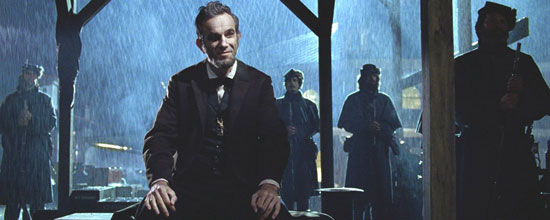Lincoln is why Hollywood should exist. Steven Spielberg's wonderful film about our 16th president isn't a war epic or a maudlin biography. The film only follows Abraham Lincoln for a few months; the earlier details of his political and personal life largely have to be intuited through his dialogue. And yet, Lincoln seems wholly complete, an emotionally satisfying retelling of an incredibly monumental part of American history. I struggle to think of another director who could have pulled it off with Spielberg's wit, confidence and utter mastery as a storyteller.
Lincoln opens, naturally, with Lincoln (Daniel Day-Lewis), shortly after his 1864 re-election in the throes of the Civil War. The hundreds of thousands who have died fighting weigh heavily on this president's slender build—Day-Lewis hunches his body, his craggy face a mirror for the carnage that Spielberg rarely chooses to show on screen. He's strong, but sagging. He's burdened, but resolute. Day-Lewis's Lincoln is a thoughtful man, prone to the kind of teachable stories that seem ripped from The West Wing. It's a reverent performance, but when you're playing a man who prevented an entire country from tearing itself apart, I'd say that reverence is well deserved.
Image may be NSFW.Clik here to view.

Daniel Day Lewis as ''Lincoln''
With political winds at his back, Lincoln delivers a message to his cabinet: his famous Emancipation Proclamation is not enough. He wants to pass a constitutional amendment -- the 13th Amendment -- to outlaw slavery in the United States. Lincoln concerns itself with the congressional battle that unravels during that quest to abolish slavery. Thankfully, Spielberg challenges his audience to work through the political intricacies of that story as he tells it. (The differences, for example, between anti-slavery advocates and abolitionists are integral to Lincoln, but Spielberg never outright explains it. Instead, he shows it.) He's practicing a historical minimalism of sorts, giving us the bare minimum of exposition we need to understand what's happening, while the more subtle aspects of his filmmaking lead us to draw the right conclusions.
What may surprise you, though, is how tense Lincoln gets. Spielberg, of course, has an uncanny talent for this kind of filmmaking. He heightens tension by using visual cues and tricks of the eye, waiting for the perfect moment to release enough to satisfy the conflict on screen. Nearly every scene in Lincoln follows this tension-and-release pattern, whether it's in a White House drawing room, a Union hospital for injured soldiers, or the raucous floor of the House of Representatives. It's an agreeable method of storytelling, and it largely explains how Spielberg made the story of the 13th Amendment so deliciously entertaining.
Of course, Lincoln does have its flaws. Sally Field chews miles of scenery as Mary Todd Lincoln, her melodramatic acting methods largely an unwanted distraction from Day-Lewis's marvelous performance. It's not that Field does a poor job as first lady, but it's simply an odd bit of casting. She's playing a character who seems to be from another film. As a result, the relationship between the president and his wife swerves between dominance and bizarre outbursts. (Is she crazy? Lincoln says no, but you can't help but wonder if Spielberg had his doubts.)
LINCOLN Image may be NSFW.Clik here to view.
 Image may be NSFW.
Image may be NSFW.Clik here to view.
 Image may be NSFW.
Image may be NSFW.Clik here to view.
 Image may be NSFW.
Image may be NSFW.Clik here to view.
 Starring Daniel Day-Lewis, Tommy Lee Jones Rated PG-13 120 minutes Opens Friday Area theaters
Starring Daniel Day-Lewis, Tommy Lee Jones Rated PG-13 120 minutes Opens Friday Area theaters
When Lincoln returns to congressional intrigue, however, it's nothing short of delightful. Tommy Lee Jones steals many a scene as Thaddeus Stevens, a fervent abolitionist who is initially wary of Lincoln's intentions, while a brilliant cast of character actors fills out other important figures who played a role in favor of, or opposition to, the abolition movement. (One of my favorites is James Spader's comic turn as William N. Bilbo, a lobbyist tasked with bribing congressmen to support the amendment.)
Lincoln will make you grin like an idiot. It gives you that unstoppable urge to smile that tickles you deep within your belly. It's Spielberg at his most endearing and enchanting. Lincoln's greatest triumph, however, is its most obvious one. Even though we know that the 13th Amendment will pass, it still seems incredible to watch on screen. I suspect many felt the same way Tuesday night, as the nation watched Barack Obama win re-election, a second term, and broad vindication from the nasty sort of politics he's faced in recent years. Many overwrought comparisons have been made between Presidents Lincoln and Obama, and while Lincoln doesn't necessarily aim to be another, you can't help but make the connection.
...more